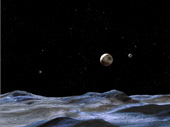Pluto Not a Planet, Astronomers Rule
Pluto has been voted off the island.
The distant, ice-covered world is no longer a true planet, according to a new definition of the term voted on by scientists today.
"Whoa! Pluto's dead," said astronomer Mike Brown, of the California Institute of Technology in Pasadena, as he watched a Webcast of the vote. "There are finally, officially, eight planets in the solar system."
In a move that's already generating controversy and will force textbooks to be rewritten, Pluto will now be dubbed a dwarf planet.
But it's no longer part of an exclusive club, since there are more than 40 of these dwarfs, including the large asteroid Ceres and 2003 UB313, nicknamed Xena—a distant object slightly larger than Pluto discovered by Brown last year.
"We know of 44" dwarf planets so far, Brown said. "We will find hundreds. It's a very huge category."
A clear majority of researchers voted for the new definition at a meeting of the International Astronomical Union (IAU) in Prague, in the Czech Republic. The IAU decides the official names of all celestial bodies.
The tough decision comes after a multiyear search for a scientific definition of the word "planet." The term never had an official meaning before.
What Is a Planet Today?
According to the new definition, a full-fledged planet is an object that orbits the sun and is large enough to have become round due to the force of its own gravity. In addition, a planet has to dominate the neighborhood around its orbit.
Pluto has been demoted because it does not dominate its neighborhood. Charon, its large "moon," is only about half the size of Pluto, while all the true planets are far larger than their moons.
In addition, bodies that dominate their neighborhoods, "sweep up" asteroids, comets, and other debris, clearing a path along their orbits. By contrast, Pluto's orbit is somewhat untidy.
